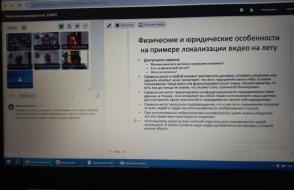On March 22, 2024, the International Round Table “Generative Neural Networks in Teaching, Scientific Research and Linguistics” took place. The event was organized by the Department of German and French Philology, the Basic Department of Technology and Translation Automation at the AKM-West Translation Agency of the Northern (Arctic) Federal University named after M.V. Lomonosov (Arkhangelsk, Russia) and the Department of Romance-Germanic Philology of the Faculty of Foreign Languages of Gomel State University named after Francysk Skaryna (Gomel, Belarus).
During the round table, researchers, teachers and translators from Gomel, Arkhangelsk, Moscow, St. Petersburg, Petrozavodsk, Kazan, Omsk, Yerevan, Changchun discussed current issues of using generative neural networks in the educational process, scientific research and translation activities.
The Head of the International Department of NArFU Lyubov Albertovna Zarubina and the Dean of the Faculty of Foreign Languages of the Gomel State University named after F. Skorina Elena Vladimirovna Sazhina addressed the participants of the round table with a welcoming speech. In their speech, they wished the participants fruitful work and new interesting meetings in the future.

In the first block of the round table, which was dedicated to neural networks in education, the key speaker was Nikita Vyacheslavovich Login, an intern researcher at the scientific and educational laboratory of the academic buildings, a graduate student at the School of Linguistics, Faculty of Humanities, National Research University Higher School of Economics (Moscow, Russia). He presented a report on the topic “Neural networks in creating language test tasks.” The relevance of the report led to a lively discussion, during which Nikita Vyacheslavovich was asked many questions, in particular, about the prospects for the widespread implementation of neural networks for the creation of educational and testing materials as part of the study of a foreign language in higher education, as well as about the advantages of neural networks offered by Russian developers.
The second block of the round table was devoted to neural networks in scientific research. The main discussion revolved around questions about the admissibility of using fragments generated by neural networks in the texts of scientific papers, the quality of the generated texts, as well as ways to combat “academic fraud” in the process of students preparing various research papers.
The third block examined the use of neural networks in linguistics and translation. The first key speaker was Stanislav Borisovich Beletsky, Candidate of Philological Sciences, researcher at the School of Philology at the National Research University Higher School of Economics (Moscow, Russia). He presented a report “Quarantine Scenarios: (Network) Analysis of the Verbalization of Nontrivial Life Experiences,” in which he spoke about the experience of verifying the results of linguistic research using neural networks.
Irina Aleksandrovna Rybnikova, head of the information support department at Positive Technologies, an expert in the field of documentation and localization (Moscow, Russia) and Svetlana Yuryevna Svetova, General Director of T-Service, an expert in the field of translation automation, post-editing of machine translation ( St. Petersburg, Russia) were key speakers on the use of neural networks in translation activities and presented a report “Large language models: results of a survey of the translation community - expectations and reality”, in which they talked about how and why translators use neural networks, as well as about specific problems associated with the use of products generated by neural networks.
Moderators of the International Round Table on the part of NArFU named after M.V. Lomonosov (Arkhangelsk, Russia) were Larisa Yurievna Shchipitsina, Doctor of Philology, Professor of the Department of German and French Philology and Elena Sergeevna Kokanova, Candidate of Philology, Associate Professor, Head of the Basic Department of Technologies and Automation of Translation at the AKM Translation Agency West"; from the Gomel State University named after. F. Skorins ‒ Vera Vladimirovna Stepanova, Ph.D., Associate Professor of the Department of Romance-Germanic Philology.
The discussion at the round table was lively and fruitful, colleagues actively shared their experience of using neural networks in the educational process, scientific research and translation, which indicates the relevance of the stated topic.














